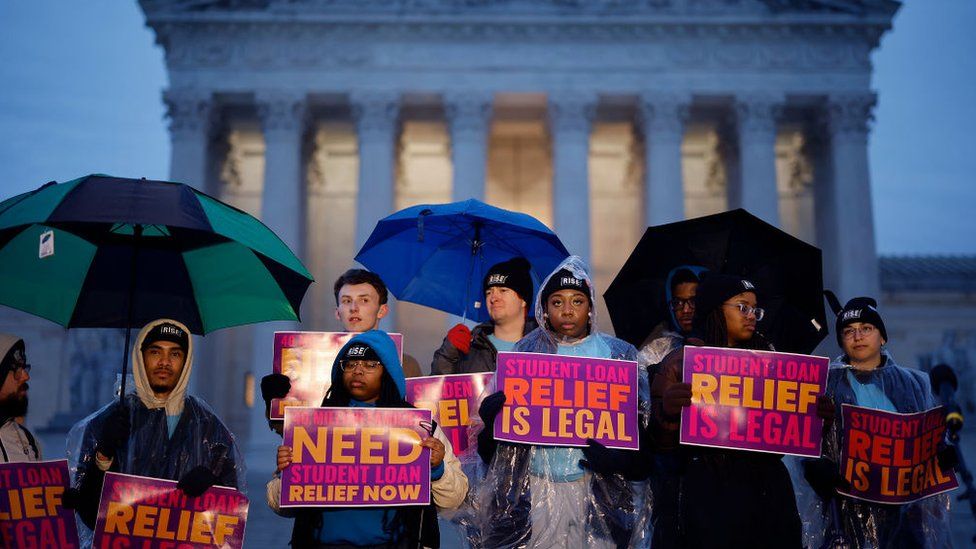ARTICLE AD BOX
 Image source, Getty Images
Image source, Getty Images
Student activists braved the cold and rain to rally outside the Supreme Court ahead of oral arguments
By Sam Cabral
BBC News, Washington
The US Supreme Court is hearing arguments in back-to-back cases that could determine the fate of more than 40 million Americans' student loans.
It comes after President Joe Biden, a Democrat, announced a plan last year to forgive up to $10,000 (£8,400) in federal student loans per borrower.
So far, Republican-appointed lower court judges have blocked the plan.
Top court justices on Tuesday questioned if the president's actions were lawful and warranted.
The Supreme Court, which has a 6-3 conservative majority, will make a final ruling on the cases by the end of June.
Student loan repayments were initially paused under the Trump administration in 2020 because of the coronavirus pandemic.
Mr Biden kept that pause in place until he decided, in August, to eliminate more than $400bn in debt - up to $10,000 each for those earning less than $125,000, and up to $20,000 for students on need-based Pell Grants.
The White House estimates that nearly 90% of the country's student borrowers will qualify for relief under its plan, and about 26 million people have already applied for forgiveness. But relief is on hold as legal challenges to the plan make their way through the courts.
The Biden administration argues it had the power to "waive or modify" federal student loan debt under a 2003 law known as the Higher Education Relief Opportunities for Students Act or HEROES Act.
Government lawyers were pushed on Tuesday morning on that broad interpretation of the law.
"We're talking about half a trillion dollars and 43 million Americans. How does that fit under the normal understanding of modified?" Chief Justice John Roberts asked lawyer Elizabeth Prelogar at oral arguments.
Mrs Prelogar replied that, in the given context, "modify" could entail making broad changes to protect borrowers. She added that the administration was not seeking to assert regulatory authority but to implement a benefits programme.
Watch: Students protest about debt outside the Supreme Court
She said that, without the plan in place, "defaults and delinquencies will surge".
Ahead of the hearing, hundreds of activists braved the cold and rain to participate in rallies outside the Supreme Court.
They were joined by some of the Democratic Party's most outspoken figures on student debt. Congresswoman Ayanna Pressley said opponents of loan forgiveness were "disconnected from the hardship of everyday folks" while Senator Elizabeth Warren warned "an extremist court" may take away the opportunity "to build more secure futures".
The White House has not yet said what it will do if justices strike down its plan.
Press Secretary Karine Jean-Pierre told reporters at Monday's daily press briefing that the administration is "very much confident in our legal authority here".
"That's why our justice department has taken it all the way to the Supreme Court."

 2 years ago
48
2 years ago
48








 English (US) ·
English (US) ·